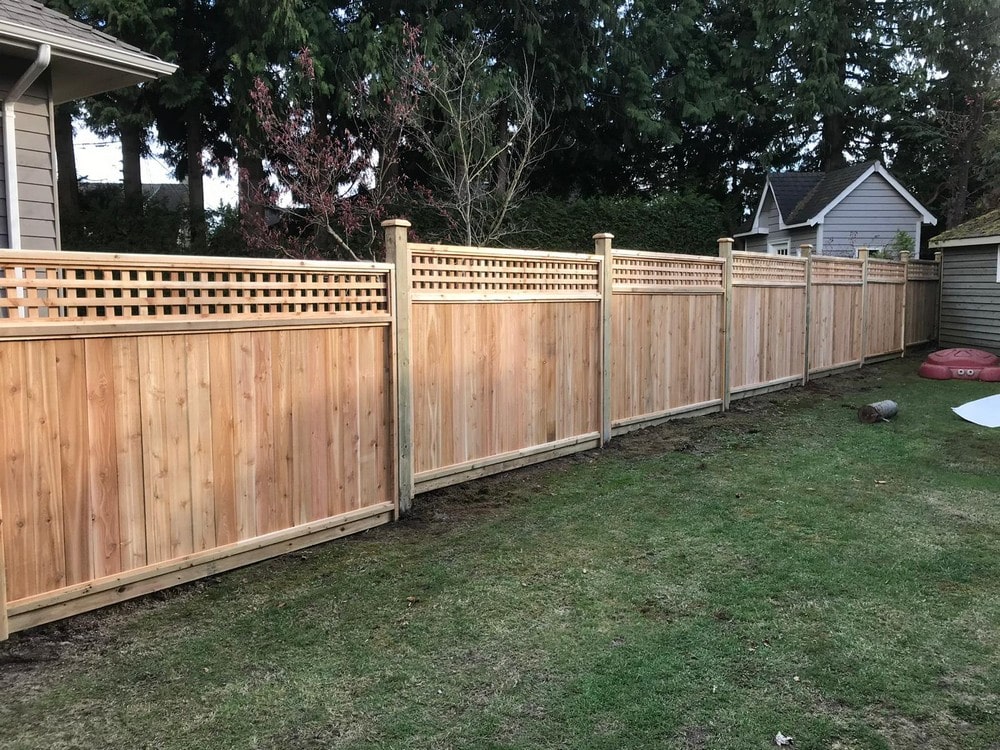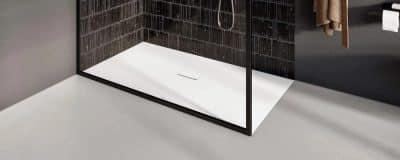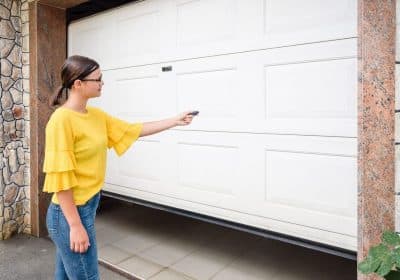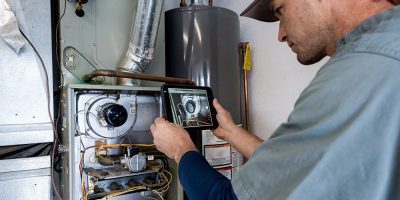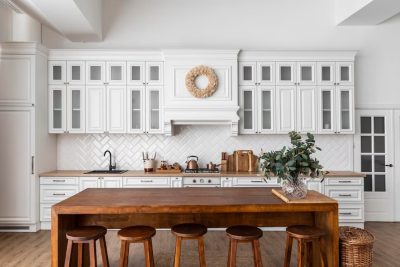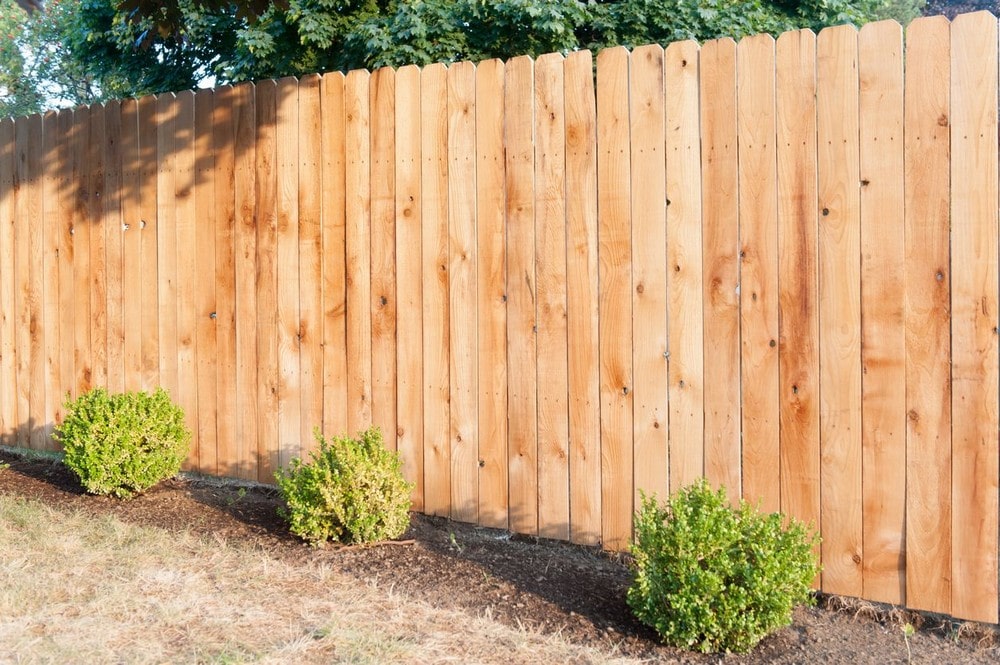
When it comes to enhancing your property, one of the most impactful decisions you’ll make is choosing the right fence material. Choosing the right fence material can be challenging, as each type has unique advantages and disadvantages. In this blog post, we’ll explore various fence materials—wood, vinyl, and metal—along with their pros and cons to help you find the best option for your needs.
Wood Fences: A Timeless Classic
Wood fences offer a natural beauty and functionality blend, making them popular among homeowners. These fences offer a natural charm that complements various home styles while providing privacy and security. However, like all fence materials, wood has pros and cons and specific maintenance requirements that must be considered.
Pros of Wood Fences
- Aesthetic Appeal: Wood fences are loved for their natural beauty. Their warm tones and unique grain patterns add charm to any property. Whether you choose a rustic picket fence or a tall privacy barrier, wood can be customized through stains and finishes to perfectly match your style, enhancing your home’s curb appeal.
- Customizability: One of the best things about wood fences is how easy they are to customize. You can pick from various wood types, like cedar, pine, or redwood, each offering distinct looks and durability. Plus, you can paint or stain the wood to complement your home’s exterior, making it your own.
- Affordability: Wood fences are often one of the more budget-friendly fencing options. The initial installation costs are typically lower than those of vinyl or metal fences, making wood an appealing choice for homeowners looking to save money without sacrificing quality.
Cons of Wood Fences
- Maintenance Requirements: Wood fencing requires regular upkeep. To keep them looking good and extend their life, you’ll need to stain or seal them every few years to guard against rot and weather damage. Without proper care, wood can deteriorate quickly, leading to expensive repairs.
- Durability Concerns: While beautiful, wood fencing can face durability issues. They are prone to moisture damage and rot, especially in humid climates, and pests like termites can also threaten their integrity. Homeowners should weigh these factors when considering the longevity of a wood fence.
- Limited Lifespan: Even with care, wood fences usually last around 15-20 years, depending on the type of wood and environmental conditions. Exposure to severe weather, humidity, and pests can shorten their lifespan.
Maintenance of Wood Fences
Consistent maintenance is necessary to ensure wood fences remain visually appealing and functionally sound. Here are key maintenance practices:
- Regular Inspections: Checking for signs of wear, rot, or pest damage regularly helps identify problems early on. It’s advisable to inspect the fence at least once a year.
- Cleaning: Removing dirt, debris, and mildew can be done with a simple soap and water solution. Power washing can help restore the fence’s natural beauty but should be done cautiously to avoid damaging the wood.
- Staining and Sealing: Applying a quality stain or sealant every 2-3 years will protect the wood from moisture and UV damage while enhancing its colour. This step is crucial for maintaining the aesthetics and longevity of the fence.
- Repairing Damage: Promptly replacing any damaged boards or components will prevent further deterioration and extend the overall lifespan of the fence.
Choosing a wood fence is an investment in beauty and functionality for your home. For more information on selecting and maintaining wood fences, visit our website.
Vinyl Fences: Low-Maintenance and Long-Lasting
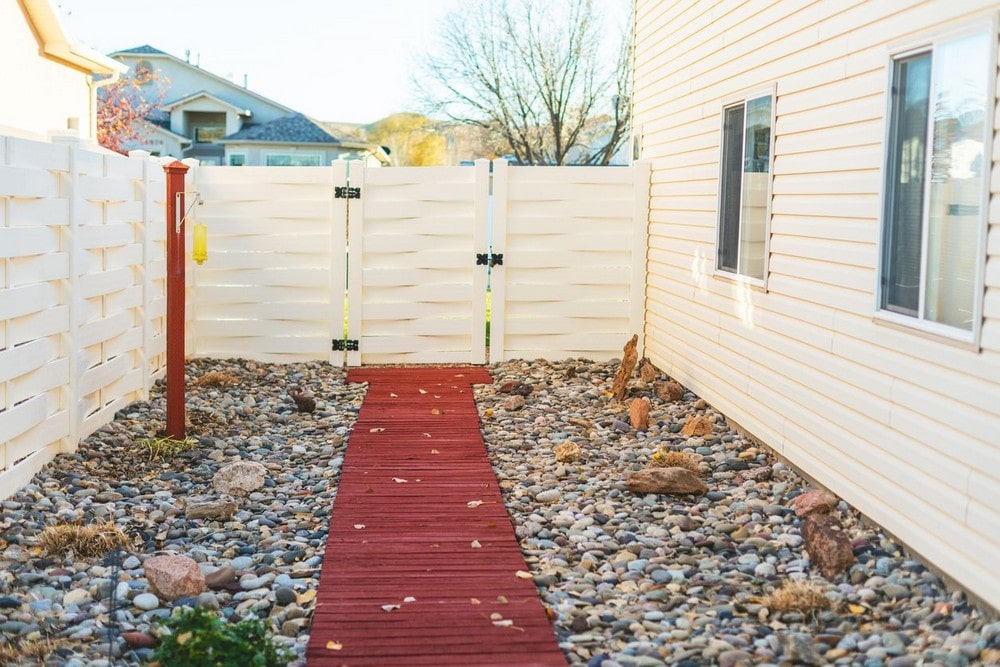
Due to its many advantages, vinyl fences have rapidly gained popularity in modern fencing solutions. Unlike traditional wood options, vinyl requires minimal upkeep without sacrificing durability or aesthetic appeal. Offering a sleek, contemporary look, vinyl fences come in various styles, making them suitable for residential properties.
Pros of Vinyl Fences
- Low Maintenance: One standout benefit of vinyl fencing is its minimal maintenance requirements. These fences only need occasional cleaning with soap and water to keep them looking fresh and new.
- Durable: Vinyl fences resist rot, insects, and harsh weather conditions, ensuring they maintain their integrity over time. This makes them a strong contender among durable fence materials.
- Variety of Styles: Available in multiple colours and designs, vinyl can fit various home fence styles, from classic white picket to tall privacy options.
- Colour Retention: Unlike wood, vinyl doesn’t require staining or painting. It maintains its colour without fading, adding to its longevity.
Cons of Vinyl Fences
- Higher Initial Cost: The upfront installation price of vinyl is typically higher than that of wood fences, which may be a consideration for budget-conscious homeowners.
- Repair Limitations: If a vinyl panel gets damaged, it often requires full replacement rather than a simple patch, increasing costs.
- Less Natural Appearance: Some homeowners may prefer the traditional look of natural wood over the synthetic appearance of vinyl, impacting aesthetic choices.
Maintenance of Vinyl Fences
Vinyl fences are known for their low maintenance requirements. Here’s how to keep them in great shape:
- Regular Cleaning: A simple rinse with water a few times a year will help remove dirt and debris. For tougher stains, use a mild soap solution.
- Inspect Panels: Periodically check for any damage or cracks. Addressing these issues early can prevent further complications.
- Avoid Harsh Chemicals: Use gentle cleaners to avoid damaging the vinyl material.
Vinyl fences can be an excellent investment for those looking for a long-term fencing option without the hassle of continuous upkeep.
Metal Fences: Durable and Secure
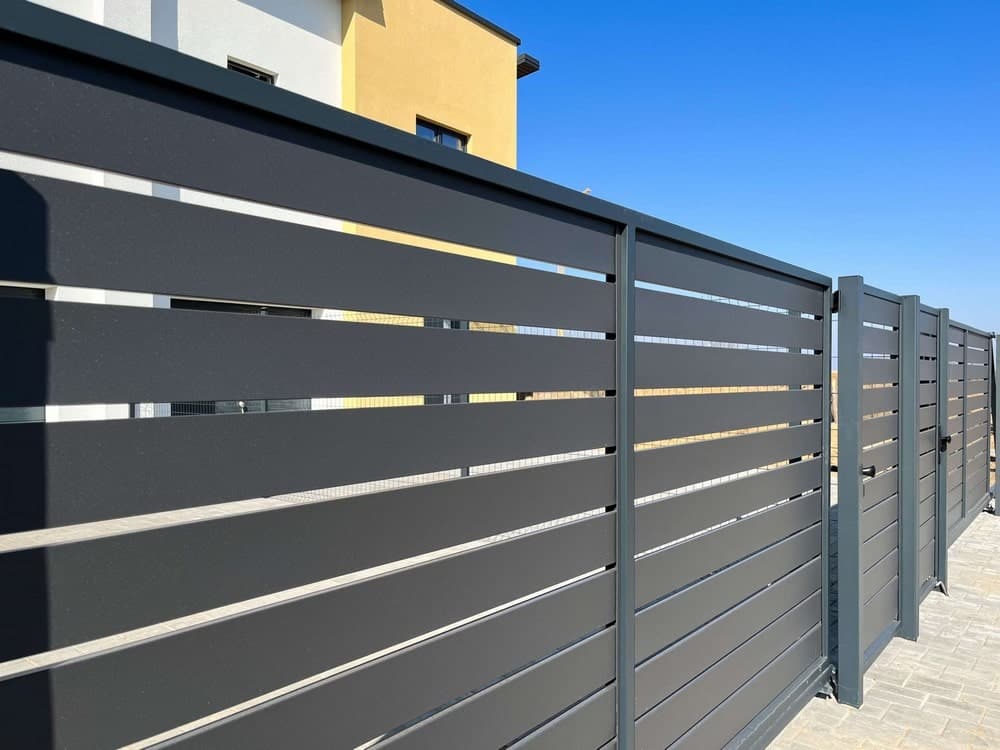
Metal fences are a fantastic option for homeowners who value strength and security. Made from aluminum and steel, they boast incredible durability, perfect for anyone wanting to boost their property’s safety while adding a stylish touch. Whether after decorative designs or robust security solutions, metal fencing offers the versatility to meet your unique residential needs.
Pros of Metal Fences
- Exceptional Durability: Metal fences are built to last, often exceeding 20 years, with proper care. Their resistance to the elements makes them ideal among durable fence materials.
- High Security: The robust nature of metal significantly deters potential intruders, making these fences an excellent option for security fencing solutions.
- Low Maintenance: Unlike wood fences requiring regular treatments, metal fences generally need minimal upkeep. A simple wash and occasional rust treatment keep them looking good.
- Elegant Appearance: Available in various styles, including decorative options like wrought iron, metal fences can enhance your home’s exterior design while providing the necessary security.
Cons of Metal Fences
- Higher Initial Cost: Metal fences typically involve higher material and installation costs than wood or vinyl options, which could impact budget considerations.
- Rust Concerns: While aluminum is generally rust-resistant, steel fences may require protective coatings to prevent corrosion, particularly in humid climates. Understanding metal fence maintenance is crucial for longevity.
- Less Privacy: Many metal fence designs need more solid barriers offered by wood or vinyl, which may result in less privacy unless specifically designed as privacy fences.
Maintenance of Metal Fences
- Regular Inspection: Check for signs of rust, especially at joints and welds. Early detection allows for prompt treatment.
- Cleaning: Wash with mild soap and water to remove dirt and grime. Avoid harsh chemicals that may damage the finish.
- Rust Prevention: For steel fences, apply rust-resistant paint or sealant every few years to protect against corrosion.
Metal fences offer a blend of durability, security, and style, making them a valuable addition to any property.
Chain-Link Fences: Affordable and Practical
Chain-link fences are a smart and budget-friendly choice for homeowners looking for dependable fencing. They effectively enclose your property while still letting in light and air. Their simple design makes a chain-link fence perfect for anyone who values affordability and practicality.
Pros of Chain-Link Fences
Affordability: Chain-link is one of the most budget-friendly options among fence materials. The lower initial installation costs make it attractive for homeowners looking for affordable fencing options.
Durability: Chain-link fences are made from galvanized steel, making them resistant to rust and corrosion. They can withstand harsh weather and wear, contributing to their long lifespan.
Low Maintenance: Unlike wood fences that require regular upkeep, chain-link fencing needs minimal maintenance. Occasional cleaning is usually sufficient to keep them in good shape.
Security: They offer good security by preventing unauthorized access to the property. Chain-link fences can be equipped with barbed wire or slats for added security features.
Cons of Chain-Link Fences
- Limited Privacy: One of the significant drawbacks of chain-link fences is their lack of privacy. Their open design allows visibility, making it challenging to shield your yard from prying eyes. Consider installing slats or opting for a privacy fence for enhanced privacy.
- Aesthetic Limitations: While functional, chain-link fences often lack the visual appeal that wood or vinyl options provide. Homeowners looking for decorative finishes may find chain-link less suitable.
- Temperature Sensitivity: Metal chain-link fencing can become extremely hot in sunny weather and very cold during winter, which might not be comfortable for pets or children playing nearby.
Maintenance of Chain-Link Fences
- Regular Cleaning: A simple wash with soap and water will help remove dirt and grime. You may need a brush to scrub the affected areas for tougher stains.
- Inspect for Damage: Check regularly for any signs of rust or damage. Addressing small issues early can prevent larger problems down the road.
- Rust Prevention: If you notice any rust spots, sand them down and apply rust-inhibiting paint to maintain the fence’s appearance and integrity.
With their affordability and low maintenance requirements, chain-link fences can provide a reliable enclosure for your property without breaking the bank.
Cost Comparison of Fence Materials
Understanding fence installation costs is crucial when selecting a material. Here’s a quick breakdown:
| Fence Type | Initial Cost Range | Longevity | Maintenance Cost |
| Wood Fences | $15 – $30/foot | 5 – 30 years | Moderate (staining, sealing) |
| Vinyl Fences | $20 – $40/foot | 25+ years | Low (occasional wash) |
| Aluminum Fences | $25 – $35/foot | 20+ years | Low (occasional cleaning) |
| Steel Fences | $30 – $50/foot | 20+ years | Low (occasional cleaning) |
| Wrought Iron Fences | $40 – $70/foot | 20+ years | Moderate (rust treatment) |
Choosing the right fence material involves balancing initial costs, longevity, and maintenance expenses. With options ranging from wood to wrought iron, there’s a perfect choice for every homeowner’s needs and budget. For more detailed insights on fencing options, visit our website.
Enhance Your Security with Reliable Fencing Solutions
Selecting the best fence material depends on various factors, including budget, maintenance preferences, and the level of privacy or security you desire. While wood offers natural beauty and affordability, it requires regular upkeep. Conversely, Vinyl is a low-maintenance, long-lasting option with a higher initial cost. Metal fences are incredibly durable and secure but may lack the necessary privacy. Get in touch today to learn more about available fencing options to find thandideal fence that blends style, security, and affordability!
